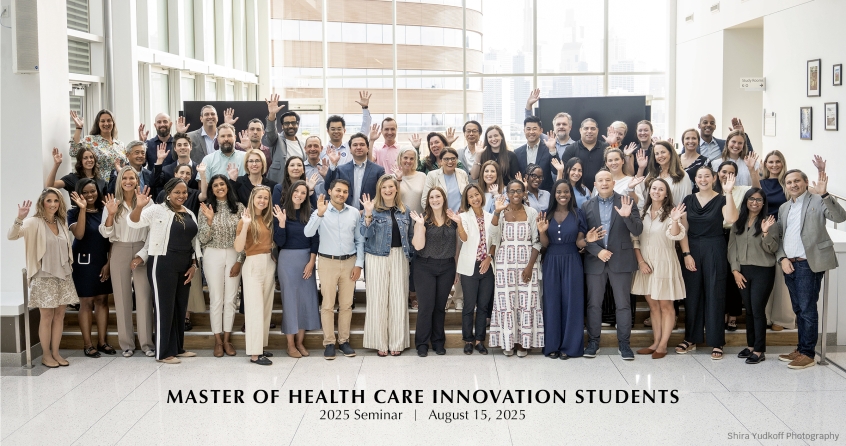Students gather in Philadelphia during the annual MHCI Seminar to connect with each other and prepare for the school year. For two or three days they participate in workshops and orientation activities, immerse themselves in innovation topics, and build memorable and enduring connections with each other, the program, and Penn. Programming complements the curriculum and optimizes the opportunities of gathering.
The next Seminar is scheduled for Thursday, August 20 through Saturday, August 22, 2026.

During Seminar, convene with other professionals committed to changing health care. Exchange ideas, share stories, gain and give advice, and begin to build the special connection to classmates that MHCI alumni consider to be a hallmark of the program.
Standard components include:
- Networking activities
- Interactive workshops to develop professional skills
- Panel discussions
- An innovation lecture
- Program and classroom orientations
- Social events
Students in the Master of Health Care Innovation (MHCI) program gathered for the ninth annual Seminar, from Thursday, August 14 through Saturday, August 16, 2025, in Philadelphia.
About 60 students gathered from across the U.S. and international locations along with several alumni, to connect with each other and the program. They discovered common passions for health care challenges, exchanged advice, and built professional and personal relationships that will help sustain their learning and inspire their work.
Seminar objectives:
-
Get oriented with the MHCI degree and learn what to expect in the coming school year.
-
Learn from innovative thinkers and leaders.
-
Build connections with classmates, the MHCI community, and Penn.
Highlights included:
-
Design Workshop: Embodied Prototyping—Maya Greenshpan guided students and alumni to use themselves, props, and the space around them to create an experience that sparked a specific emotion. She connected that prototyping exercise to considering how physical space can make a patient feel heard, or a medical device might inspire confidence instead of fear.
- Aligning Innovation Techniques with the Problems They Solve—Allen Cubell, former Executive Director of Innovation Penn Medicine Lancaster General Health, shared career insights, discussed the process of launching an innovation center, and offered a decision-making framework that is useful for leading innovation.
- High-Performing Teams workshop—New students built community as well as team and leadership skills in this session led by Melissa Yousef, Senior Consultant Organizational Design, Manager for Penn Medicine Academy.
-
Companions in Innovation—A panel of innovators shared stories about health care challenges or gaps they worked to address, the solutions they helped to develop, and the lessons they learned.
- Glory Durham, MPH, MBA (Moderator)—Senior Director of Healthcare Strategy, Penn Health-Tech and Wharton’s Venture Lab
- Laura Kavanaugh, MHCI ’23 —Transformation Manager, Center for Insights to Outcomes, Penn Center for Health Care Transformation and Innovation
PROJECT: Preparing patient records in a timely way - Vrushabh “Vrush” Ladage, MHCI ’19, MS—Senior Research Scientist, The Parity Center, Penn Dept. of Medical Ethics and Health Policy
PROJECT: Shifting provider behavior to reduce prescription costs for oncology patients - Mark McAnallen, MBA—Innovation Coach, Good Shepherd Rehabilitation
PROJECT: Improving progress of pediatric patients in physical therapy treatment over a desired timeframe - Jonathan Zhu, BSN, RN—PhD Candidate, Penn Nursing; T32 Predoctoral Fellow, NewCourtland Center for Transitions and Health
PROJECT: Reducing interruptions to sleep for hospitalized patients
- Health Care Policy Q&A and a chocolate tasting with Zeke—MHCI founding faculty member and renowned policy expert Dr. Ezekiel Emanuel shared his lessons in chocolate making during a brief lecture and tasting. Then MHCI alumna and women’s health innovation leader Anuja Dokras, MD, PhD, MHCI ’22, led a conversation with Dr. Emanuel and the students on cycles of interest in health care, health insurance opportunities for innovation, and potential areas for reform.
-
Using AI in Your Education Workshop—Generative AI can be a useful tool in your education, if you are a critical user who understands its strengths and limitations. This session explored what AI is and isn’t, addressed misconceptions, and presented methods for using it effectively in coursework. Students practiced real use cases. With Meryl Krieger, PhD, and Adam D. Zolkover.
- Cross-Cohort Connections—Facilitated conversations built meaningful links among students.
- Alumni Showcase—Four MHCI alumni discussed their favorite innovation projects and shared advice for students.
-
Raphael Aquino, MHCI ’23—Executive Director and Founder, The Lab Project; Senior Director Innovation and Technology, BMDI Consulting; Adjunct Faculty University of Maryland, Baltimore Country; and Recent Ford Philanthropy Mobility Fellow
PROJECT: Storytime 2 Health to improve access to health literacy at Concordia Children’s Services in the Philippines -
Ashley Boenisch, MSN, RN, MHCI ’25—Clinical Director of Hearty & Vascular, Penn Medicine/UPHS; Advanced Nurse Clinician/Nurse Educator, Virtua Health
PROJECT: Initiate and scope a health system nursing innovation program aligned with strategic priorities -
Joe Hinderstein, MHCI ’24 —Sales Director, Northwell Direct; Advisor, Redesign Health; Founder, Joseph Hinderstein, LLC
PROJECT: Create a health equity fellowship to drive improvements across a large organization at the department, caregiver, and patient level -
Martina Plag, Pn1, MHCI ’21 —Innovation Design Strategist, Center for Insights to Outcomes, Center for Health Care Transformation and Innovation@Penn Medicine
PROJECT: C3P3 Innovation Accelerator Program to demonstrate how human-centered design principles can transform cervical cancer prevention at Penn Medicine by automating routine workflows and centralizing expert care
MHCI students toured the Penn campus in small groups, learned about University history and current resources, and shopped for Penn gear at the bookstore.
Room, board, and conference activities for Seminar are covered by the program at no additional cost to the students. Transportation to and from Philadelphia for the event, as well as incidental expenses, are the responsibility of each student.
Please note that students in the Master of Health Care Innovation are not eligible for an F-1 student visa. International students should allow sufficient time to arrange for a B-1 visitor visa in order to attend Seminar in Philadelphia. Penn's International Student and Scholar Services (ISSS) could assist you with obtaining the visa.


